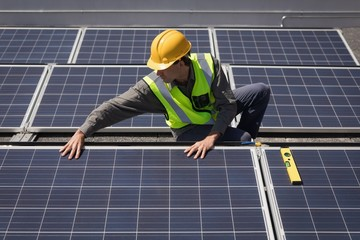
About William Boos
William Boos, previously of Direct Airway, is an experienced aviation professional and air-traffic controller. William built a reputation within the industry for his commitment to safety and efficiency, performing essential duties such as management the flow of aircrafts into and out of his airport’s airspace, helping pilots during landings and takeoffs, and monitoring aircraft through their travels. Colleagues speak to William’s keen attention to detail and dedication to a job well done, and his aviation industry experience is underlined by an interest in continuing developing crucial skills for better flight experiences.
Currently, William Boos works within the solar power industry, recognizing that the field is making crucial contributions to sustainable energy, increasing access to cost savings for consumers, and building towards the future of residential and commercial properties.
William Boos, Previously of Direct Airway, Explores the Advantages of Solar Energy

As a solar energy professional, William Boos realizes that the field is growing in popularity. In 2022, for example, the residential solar market experienced its 6th consecutive record breaking year, having grown 40% since 2021. With that in mind, many people are exploring solar as a means to contribute to sustainable energy and play a role in the future of its technology.
Here, William Boos, formerly of Direct Aviation, provides information on a few of solar energy’s benefits contributing to the industry’s growth over time.
Environmental Impact
One of the primary benefits of solar energy is its ability to contribute to a cleaner environment. This is because, for each kilowatt-hour (kWh) of solar energy generated, there is a substantial reduction in CO2 and other greenhouse gas emissions. Today, we know just how damaging greenhouse gas emissions and dangerous pollutants such as nitrogen oxides, sulfur oxides, and other particulates can be to our continued health and that of our environment. Investment in solar energy is, therefore, a productive way to limit harm to our planet and protect the environment for future generations to come.
Cost Savings
In the current economy, cost savings can be extremely beneficial for residences and commercial properties alike. Solar is often cited for its ability to reduce electric bills. Generating your own electricity helps with becoming less reliant on electricity companies, and the 25-35 year projected lifespan of solar panel systems helps ensure that investing can increase savings for decades to come. William Boos finds that solar’s ability to reduce reliance on electricity can also help individuals save by avoiding annual increases. On top of this, solar energy systems have relatively low maintenance costs as long as they are unaffected by the environment and are kept free of debris.

Job Creation
As the solar energy and renewable power industry continues to grow, a number of jobs are created that ultimately boost our economy and provide opportunities to professionals interested in work within the field. As of 2022, there were almost 300,000 solar energy jobs in the United States along, with this number only increasing as investment into the sector increases. As a whole, there are almost 13 million renewable energy jobs globally, ensuring that people of all walks of life can access opportunities to get in on the rapidly expanding industry. We know how important job creation is as people work to improve their quality of lives and contribute to meaningful infrastructure, and William mentions that this trend of market and career growth is only expected to continue in the future.
Accessibility
When compared to other forms of renewable energy, solar energy is known for the diverse applications of its use. Solar can be used to generate electricity or heat, producing electricity in areas that do not have access to the energy grid. William Boos notes that, worldwide, solar is a valuable resource for distilling water, powering satellites, you name it. Solar’s accessibility in terms of powering homes, appliances, and pieces of our infrastructure contribute to its popularity over time, especially as remote, off-grid regions seek to make changes that drastically improve the quality of life of their communities.
Home Value Improvement and Monetary Incentives
Experts find that, on average, solar can increase home values by $20 for every $1 reduction in a homeowner’s annual energy bills. This can be valuable for homeowners looking for a return on their investment when it comes time to sell. William Boos, aviation expert and current solar professional, acknowledges that there are other monetary incentives for solar investment as well. Many states provide financial incentives in terms of tax exemptions on solar equipment as well as tax credits that can be claimed on federal income taxes.
Interested in More from William Boos, Aviation and Solar Expert?

William-Boos.com was created as a platform for readers who would like to learn more about William’s areas of expertise. William mentions how professional resources that break down key concepts in areas such as aviation, solar, and more can be incredibly helpful for professionals looking to make informed decisions within their industries, access opportunities, and show their commitment to quality service along the way.
Future posts will include comprehensive information on topics such as:
- Aviation
- Solar Energy
- Professional Development
- Aviation and Solar News
Thank you for visiting the site and, for more information inspired by William Boos, aviation and solar professional, be sure to tune in for future content inspired by his insights.
